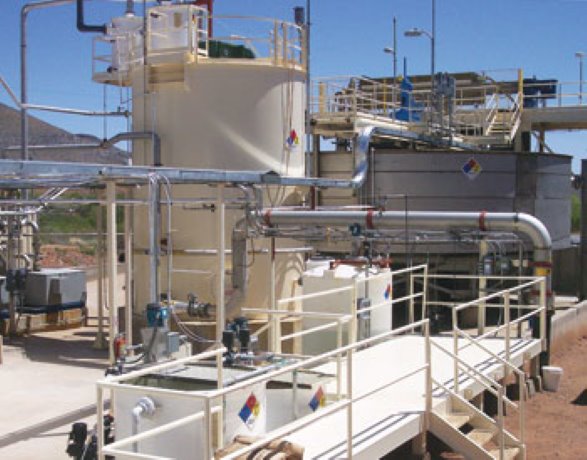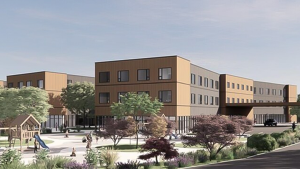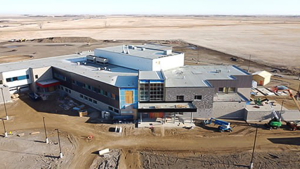As the number of industrial plants in Canada and the rest of the world increase, so does the volume of liquid waste that needs to be treated before being discharged safely.
As the number of industrial plants in Canada and the rest of the world increase, so does the volume of liquid waste that needs to be treated before being discharged safely.
At the same time, says Clem Pelletier, CEO of Vancouver-based Rescan Environmental Services, environmental regulations are tough and getting tougher.
These converging trends are forcing industry to do a better job of treating waste and do it without breaking the bank.
Fortunately, Canadian companies are riding to the rescue with a variety of waste treatment technologies.
Vancouver-based Paradigm Environmental Technologies Inc. manufactures a product called MicroSludge, which reduces the amount of waste-activated sludge (WAS), which is generated in large quantities at municipal and industrial water treatment plants.
Paradigm president and CEO Gordon Skene said WAS is in most cases either incinerated, land-filled or land-applied.
“But WAS has economic and environmental value,” he said.
“It is a potential source of green renewable energy that can lower greenhouse gas emissions and an industrial plant’s environmental footprint.”
A MicroSludge treatment plant is modular, with each component about the size of a compact car. When put together, each plant is about the size of a truck.
The components are assembled at Paradigm’s facility in New Westminster and shipped by container to a client’s site.
Paradigm has installed a demo treatment plant at Catalyst Paper’s pulp mill in Crofton, BC.
A commercial MicroSludge plant will also be located at the Lulu Island water treatment facility.
It has been approved by Metro Vancouver and will be installed later this year.
Toronto-based BacTech Environmental Corporation has exclusive rights to the BACOX bioleaching technology, which combats the contamination of water caused by abandoned mines.
Sulphides in mine waste react with oxygen in the atmosphere to create an acidic solution called acid mine drainage (AMD), which leaches into the surrounding area over time.
“There are tens of thousands of sites around the world that are full of toxic chemicals,” said BacTech president Ross Orr.
The current practice is to treat the discharge of water from the mine waste, but this does not prevent the possibility of future problems because the sulphides remain in the waste.
Bioleaching stabilizes the toxins in the waste and prevents additional AMD.
BACOX bioleaching plants have been installed at gold mines in Australia, Tasmania and China and another one is scheduled to be installed in Snow Lake, Manitoba.
BacTech COO David Salari said the Snow Lake plant will process 300,000 tonnes of arsenopyrite concentrate (about the size of a football field) that has been lying on the surface for about 50 years.
He said BacTech will hire Manitoba contractors for site preparation, concrete, mechanical and electrical installation.
The company will also hire a construction manager and an on-site project manager.
They want to start construction, late this year, after the environmental application has been approved by Manitoba Conservation.
Salari said the project has two main challenges.
One challenge is the long northern Manitoba winter, which restricts construction to less than a full year.
The second challenge is the availability of local contractors.
Vancouver-based BioteQ Environmental Technologies Inc. has developed technologies that recover dissolved metals in water and removes sulphate from water for customers in mining, oil and gas and power generation.
The processes that recover dissolved metals create two products. One is a commercial metal sulphide that can be shipped to a refinery, where it can be converted into useful products. It also creates treated water, which can be re-used or discharged safely into the environment.
BioteQ also has a process that removes calcium and magnesium sulphates.
The process produces a commercial gypsum by-product and clean water.
“We run the treatment plants for our customers and provide operator training and ongoing operation services,” said vice president corporate development Tanja McQueen.
A BioteQ facility has fixed and skid or trailer-mounted portable versions, but they have the same components.
These include tanks of variable numbers and sizes, pumps, clarifiers, piping, electrical, process control systems and software.
The fixed plants range in size from a small house to a football field, depending on the volume of water to be treated and the complexity of the treatment process.
All the plants are monitored remotely from Vancouver.
McQueen said construction takes an average of two to six months. In addition to having to work under tight time constraints, it is also challenging to find workers willing to go to cold, remote worksites, and get the equipment there.











Recent Comments
comments for this post are closed